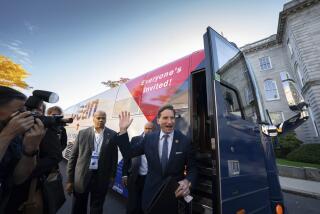Gephardt Doesn’t Tarry, Travels to Primary Turf
- Share via
CONCORD, N.H. — In the rotunda of Concord’s century-old legislative office building, flanked by the Stars and Stripes and the silver-and-blue state flag, House Minority Leader Richard A. Gephardt (D-Mo.) was staging what amounted to the first press conference of the next New Hampshire presidential primary campaign.
For the record, the man regarded as the most credible potential rival to Vice President Al Gore for the Democratic presidential nomination in 2000 shrugged off questions about his ambitions. “The future will take care of itself,” Gephardt said.
But in reality, neither the Missouri congressman nor any other Democrat besides Gore has any time to lose. The huge advantages Gore will bring to the race as President Clinton’s heir apparent means that “this campaign is going to begin very early” for those hoping to overtake him, said Nebraska Sen. Bob Kerrey, another Democratic prospect for 2000.
So it seemed to political professionals more than coincidental that Gephardt trekked not only to New Hampshire during the congressional Easter recess, but spent part of the break visiting Iowa, the other crucial early testing ground in the presidential derby.
Along with the need for Gore’s potential rivals to build a foundation of leadership alliances and grass-roots support, there is another reason the presidential campaign clock is already running--the imperative for Democrats to redefine their party in the aftermath of Clinton’s transitional presidency.
“We are all ‘new’ Democrats now,” Gephardt said in an interview, borrowing the phrase Clinton used to distance himself from the liberal image that caused many voters to abandon the party in the 1970s and ‘80s.
But in interpreting that term, Gephardt gives it a much different spin, harking back to the experimentalism of the New Deal and the heyday of government activism. “Our job, just as it was in Franklin Roosevelt’s day, is to figure out how to adapt the same set of Democratic values to today’s circumstances,” he said.
“I don’t think people have rejected government,” he added. “I think they are displeased with government that doesn’t work properly. What we need to do is get rid of what doesn’t work and figure out what does work.”
The distinction between Gephardt’s populist approach and the more conservative views propounded by Clinton and subscribed to by Gore could well hold the key to the next Democratic contest.
Gore’s political future, analysts agreed, sinks or swims with the record of Clinton’s second term. “The best politics is to have a good administration,” said Karen Skelton, Gore’s political director.
Reversing that proposition, Gephardt supporters said that--if things go badly, particularly with the economy--Gephardt needs to be positioned to exploit the bad news.
While Clinton and Gore invariably stress how much improvement they have wrought in the economy, Gephardt points to the diminution of the American dream.
“I think the standard of living . . . for working families and . . . their ability to raise children properly have gone in the wrong direction since 1988,” Gephardt warned. “And I think the people are anxious for us to address these problems.”
More to Read
Get the L.A. Times Politics newsletter
Deeply reported insights into legislation, politics and policy from Sacramento, Washington and beyond. In your inbox twice per week.
You may occasionally receive promotional content from the Los Angeles Times.









